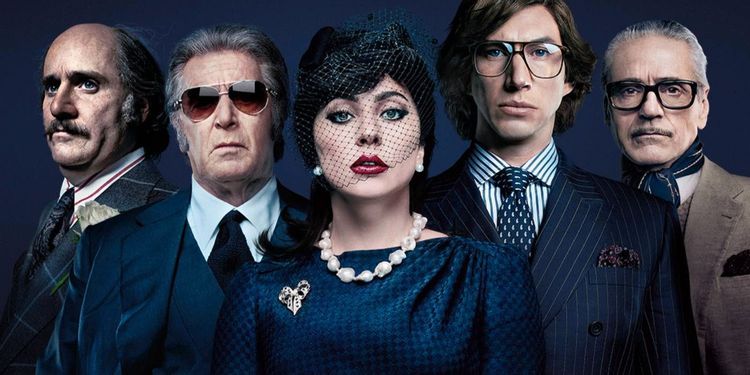“House of Gucci” Stumbles on the Runway

by Kyla Sanchez ‘22
 For all House of Gucci that covers in a 28 year timeline of generational power, wealth, iconic fashion, jealousy, murder, and more over the span of more than two hours, it ends up feeling like an empty film. What could’ve been a campy delight, a bone-chilling, realistic drama, or something entirely new ends up being a lukewarm re-telling of a tabloid drama with not much to say about its source material.
For all House of Gucci that covers in a 28 year timeline of generational power, wealth, iconic fashion, jealousy, murder, and more over the span of more than two hours, it ends up feeling like an empty film. What could’ve been a campy delight, a bone-chilling, realistic drama, or something entirely new ends up being a lukewarm re-telling of a tabloid drama with not much to say about its source material.
The story begins in 1970 with Patrizia Reggiani (Lady Gaga), a middle-class, glamorous, and driven Italian woman who bumps into Maurizio Gucci (Adam Driver), heir to the Gucci fashion house, by chance at a party. Patrizia aggressively pursues the shy, awkward Maurizio and they fall in love–their marriage setting into course a spiral for the Guccis, with family betrayal, revenge, indulgence, and more over the course of three decades. The movie ends with the infamous murder of Maurizio Gucci, who was sent an assassin by Patrizia herself after years of his ignoring her and the company to indulge in his mistress and luxuries.
The biggest issue with the movie, and what many viewers may be walking out the theater wondering is: what’s the point of House of Gucci? Despite the long runtime, there is really no unifying intention or message that is conveyed to the audience. Patrizia does this, Uncle Rodolfo Gucci does that, but it never comes together to form a cohesive message. It seemingly offers no commentary on family legacies, power, excessive wealth, or anything else that a story such as this could touch on; not through means of the visual framing of events, dialogue, or anything else. The plot simply bumbles from one event to the next with no driving force to keep it intriguing, leaving the audience often lost and bored, especially as things slow down in the middle.
Another issue, that perhaps heavily contributes to the former, is that the script is generic. At times, scenes seem to lose their narrative purpose in contributing to an overall vision for the film. Additionally, despite being a prestigious family drama, a genre that is typically full of twisted, complex relationship dynamics, characters often feel like they are talking to no one and have no tension-filled exchanges.
The cinematography is another major let-down, with a surprising lack of shots of splendor and opulence as one would expect from a film surrounding Gucci. Director Ridley Scott seems to be lacking creative interest most of the time, with flat back and forth shots used repetitively, making the film meander even more.
One of the few redeeming factors of the film is Gaga’s performance as Patrizia. She is by far the most interesting character–with grit, bluntness, and a twisted and uncertain ambition that makes her stand out from the other characters (who often feel like undeveloped, Italian caricatures with Mario-like accents more than real people to be invested in). It is a wonder the filmmakers didn’t center the film around Patrizia entirely; it would likely have focused and improved the writing.
House of Gucci has some moments of potential, but for the most part, the viewer is left waiting for excitement and intrigue that never appears. While some Gaga and some fun costuming moments make the film lightly glimmer, House of Gucci never truly shines.
Grade: D+